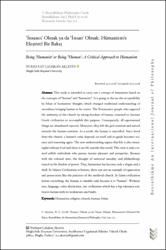'İnsancı' Olmak ya da 'İnsan' Olmak: Hümanizm’e Eleştirel Bir Bakış
Abstract
Bu makalede “insancı” kavramı ile “insan” kavramı üzerinden bir hümanizm eleştirisi amaçlanmaktadır. Ayrıca insanı merkeze alarak geleneksel kutsallık an-layışını dönüştüren hümanizm düşüncesinin İslâmî açıdan kabul edilebilirliği tartışılacaktır. İnsanın özgürleşmesini temele alarak kilisenin otoritesine baş-kaldıran Rönesans insanı, bu amacını gerçekleştirmek için yine kendi tarihine, yani Antik Yunan’a döner. Bunu yaparken doğa üstü her şeyi bir kenara bırakır. Dahası Tanrı merkezcilikten, insan merkezciliğe yönelme söz konusudur. Bu-nun sonucunda da insan kutsallaştırılmıştır. Kiliseden özgürleşen bireysel insa-nın değeri yine kendisi, kılavuzu ise akıl ve bilimdir. Tanrı olmadan da hayatın anlamlı olduğunu savunan hümanizm için, bu dünya dışında bir hayat yoktur. Bu görüş ise sadece bu dünya mutluluğu ve refahı peşinde koşan bencil bireyler or-taya çıkarmıştır. Dolayısıyla hümanizm, bir kılıf haline gelmiştir. Oysa İslâm Medeniyeti, tarihte Orta çağ kilisesinin uygulamalarına benzer baskı ve zulüm örneği yaşamamıştır. İslâm medeniyetinde “insan”, her şeyden önce sadece in-san olduğu için değerlidir. Irk, dil, renk ayrımı olmadan insanı, kusuru ve günahı ile kucaklayan bir hoşgörüye sahiptir. This study is intended to carry out a critique of humanism based on the concepts of “human” and “humanist”. It is going to discuss the acceptability by Islam of humanistic thought, which changed traditional understanding of sacredness bringing human to be center. The Renaissance people who opposed the authority of the church by taking freedom of human, returned to Ancient Greek civilization to accomplish this purpose. Consequently, all supernatural things are abandoned rejected. Moreover, they left the god centrism and moved towards the human-centrism. As a result, the human is sanctified. Since freed from the church, a human’s value depends on itself and its guide becomes sci-ence and reasoning again. The new understanding argues that life is also mean-ingful without God and there is no life outside this world. This view is only cre-ated selfish individuals who pursue instant pleasure and prosperity. Because with the colonial wars, the thought of universal morality and philanthropy stayed in the shadow of power. Thus, humanism has become only a slogan and a shell. In Islamic Civilization in history, there was not an example of oppression and persecution like the practices of the medieval church. In Islam civilization before everything, the human is valuable only because it is “human”. Without race, language, color distinction, our civilization which has a big tolerance em-braces human with its weaknesses and faults.


















